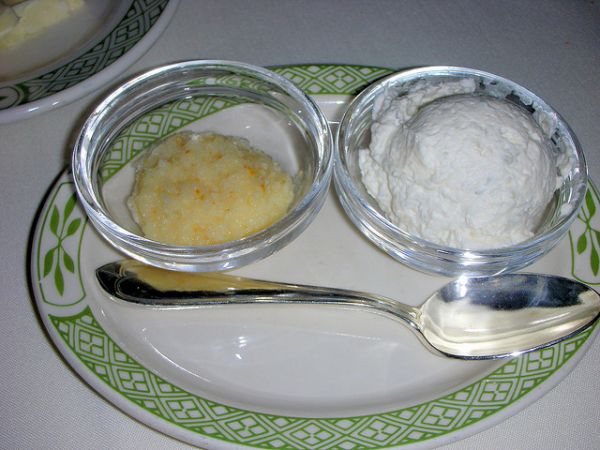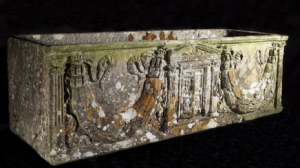A pinch of history here, a dash of fact there -the origin of seasonings always turns out perfect, any way you spice it.
1. Pepper
If
you eat enough pepper you’ll start to sweat, which explains why the
ancients thought the stuff made an excellent medical treatment. The
Chinese employed it as a treatment for malaria, cholera, and dysentery,
while Indian monks used it as a sort of PowerBar: they swallowed small
amounts of the stuff in hopes that it would help them survive their long
treks through the rough countryside. Later, pepper became so valuable
that it served as a de facto form of currency; it was used for centuries
in Europe to pay rent and taxes. In one exceptional case, it was also
used for ransom: Attila the Hun is said to have demanded about 3,000
pounds of the stuff in 408 C.E.; in exchange, he promised to lay off the
city of Rome and stop sacking it.
2. Salt

(Image credit: Flickr user
niznoz)
It’s
probably been the most valuable food additive in all of history, mostly
because it did such a good job of preserving foods in the centuries
before the refrigerator was invented. Salt mines in Chehr Abad, Iran,
also testify to the stuff’s ability to preserve people. Four “salt men”
have been discovered there, eerily mummified by what they were digging
for; two of them may date as far back as 650 B.C.E. But the use of salt
far predates the Iranian salt men. In China, writings that are something
like 4,700 years old testify to its value; the Peng-Tzao-Kan-Mu, the
earliest known treatise pharmacology, mentions more than 40 kinds of
salt. And a tragic piece of Chinese folklore that has probably been
around since the time of the Peng-Tzao-Kan-Mu tells a story of how the
phoenix, that majestic mythical bird, first brought salt to the
attention of a lowly peasant – who was accidentally put to death by a
temperamental emperor before anyone realized the value of what he had
found.
3. Cinnamon
Although
it’s originally from the hard-to-reach island of Ceylon (a.k.a. Sri
Lanka), cinnamon has been a global sensation for millennia. It first
appears in Chinese writings that date to 2800 B.C.E. (they called it
kwai). Cinnamon was also used by the Egyptians in embalming, perhaps, as
with salt, for the same reason that it became a popular cooking spice –
its warm aroma and antibacterial properties could hide the stench of
food starting to go bad. The Romans had attachments to cinnamon, too,
both medical and sentimental. Pliny the Elder records the stuff as being
worth about fifteen times its weight in silver. And the Roman Emperor
Nero, known for both his evil tendencies and his extravagance,
sacrificed a year’s supply of the stuff as an apologia for murdering his
wife – although we’re guessing Roman spice merchants failed to
appreciate the gesture.
4. Nutmeg
Like
cinnamon, this one’s been a popular spice since the days of, yep, Pliny
the Elder, who writes about a curious plant that bears two spices:
Nutmeg is the plant’s seed; mace is made from a fleshy covering around
the seed. Nutmeg’s distinctive scent (think eggnog) has made it
consistently popular throughout the ages; Emperor Henry VI reportedly
had workers blanket the streets of Rome with the aroma in celebration of
his crowning. The vast majority of the world’s nutmeg now comes from
the tiny Caribbean island of Grenada – in fact, the local economy is
based almost entirely on tourism and nutmeg exports, and the spice is
the centerpiece of the country’s flag – but that’s not where the plant
originated. In fact, nutmeg didn’t even exist in Grenada until British
sailors brought it there in the early 1800s; it’s from the East Indies,
not the West Indies. The British had good reason for introducing an
invasive species, though: The combination of a blight, political
upheaval, and Dutch merchants who burned nutmeg warehouses to keep the
prices high had pretty much wiped out the world supply of nutmeg at that
point.
5. Ginger
There’s
plenty of debate over whether Marco Polo brought back pasta from his
trip to China, but one thing is certain: he did bring back ginger.
Hugely popular in the Roman Empire, ginger suffered roughly the same
fate as said empire; by Polo’s days, it was barely known in the West.
Polo and company reintroduced it as a rare luxury, and it stayed that
way for centuries. In fact, Queen Elizabeth was a noted enthusiast, and
some historians think she may have invented the gingerbread man.
6. Horseradish
Anything
that tastes as strong as horseradish has got to have a history of use
in medicine – and indeed, horseradish does; in the 3,500 years that
humans have been eating it, they’ve used it to treat everything from
rheumatism to tuberculosis, from lower back pain to low libido.
Hippocrates wrote about it (along with the 400 other spicy medicines he
recommended), and the oracle at Delphi was a big fan, too; he supposedly
told Apollo that “the radish is worth its weight in lead, the beet its
weight in silver, and the horseradish its weight in gold.” Horseradish
had a bit of a renaissance during, well, the Renaissance; as a food fad,
it spread all over Europe and Scandinavia, and by the late 1600s, it
was a British staple, eaten alongside beef and oysters and made into
pungent cordials. Which is all fine and good (we like the stuff too),
but why is it called horseradish? The answer has very little to do with
horses. The Germans call the stuff “meerrettich,” or “sea radish,” since
that’s where it grows. English-speakers may have picked up the word and
bastardized it to “mare-radish,” which then became
not-necessarily-a-female-horse radish. We, however, prefer the more
descriptive name that some American settlers used for it; they
charmingly (and accurately) called it “stingnose.”





 There
is a deeply held Beltway myth of Paul Ryan, Man of Big Ideas, and it
dies hard. But, if there is a just god in the universe, on Thursday
night, it died a bloody death, was hurled into a pit, doused with
quicklime, buried without ceremony, and the ground above it salted
and strewn with garlic so that it never rises again. On foreign policy,
Ryan occasionally rose, gasping, to the level of obvious neophyte. (He
was more lost in Afghanistan than the Russian army ever was.) On
domestic policy, his alleged wheelhouse, he was vague, untruthful, and
he walked right into a haymaker he should have seen coming from a mile
off, when he started bloviating about Biden’s role in the “failed”
stimulus program, only to have Biden slap him around with Ryan’s own
requests for stimulus money for his home district back in Wisconsin. He
also made it quite clear that a Romney-Ryan White House will do
everything it can to eliminate a woman’s right to choose. This should
make for some fine television commercials over the next few weeks.
There
is a deeply held Beltway myth of Paul Ryan, Man of Big Ideas, and it
dies hard. But, if there is a just god in the universe, on Thursday
night, it died a bloody death, was hurled into a pit, doused with
quicklime, buried without ceremony, and the ground above it salted
and strewn with garlic so that it never rises again. On foreign policy,
Ryan occasionally rose, gasping, to the level of obvious neophyte. (He
was more lost in Afghanistan than the Russian army ever was.) On
domestic policy, his alleged wheelhouse, he was vague, untruthful, and
he walked right into a haymaker he should have seen coming from a mile
off, when he started bloviating about Biden’s role in the “failed”
stimulus program, only to have Biden slap him around with Ryan’s own
requests for stimulus money for his home district back in Wisconsin. He
also made it quite clear that a Romney-Ryan White House will do
everything it can to eliminate a woman’s right to choose. This should
make for some fine television commercials over the next few weeks. For a numbers guy, Paul Ryan sure has a lot of problems with numbers and the truth.
For a numbers guy, Paul Ryan sure has a lot of problems with numbers and the truth.








 Billions of years from now, in the final seconds before the heat death
of the universe snuffs out life for all eternity, the last living
creature can take comfort in the fact that we didn't fade away before
creating the
Billions of years from now, in the final seconds before the heat death
of the universe snuffs out life for all eternity, the last living
creature can take comfort in the fact that we didn't fade away before
creating the  (Image credit: Flickr user
(Image credit: Flickr user  (Image credit: Flickr user
(Image credit: Flickr user  (Image credit: Flickr user
(Image credit: Flickr user  (Image credit: Flickr user
(Image credit: Flickr user  (Image credit: Flickr user
(Image credit: Flickr user  (Image credit: Flickr user
(Image credit: Flickr user 






